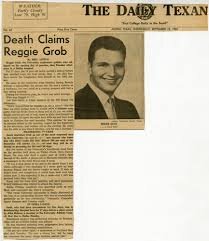Reggie Grob was well-liked and respected on the football team. He was the first walk-on of Royal’s career to earn a scholarship.
On September 1, 1962, three Texas football players collapsed from heat exhaustion and were rushed to the hospital. All three - Lee Hensley, Jim Besselman, and Reggie Grob were in satisfactory condition by Saturday night. Besselman and Hensley were released from the hospital, but not Reggie Grob. Since Reggies’s core temperature reached 106, he remained in the hospital for observation. His situation progressed from heat exhaustion to heatstroke to kidney failure took 17 days. Unfortunately, he died two weeks later. Texas A & M and TCU players also suffered heat-related incidents, but the players recovered.
Pat Culpepper played ball for the Horns in the early ’60s, and he wrote an Orange Blood thread about what happened in 1962 that finally exposed “water is for sissies” as a form of quackery.
Pat says, “We (Longhorns) had come through two weeks of full pad practices in the Austin heat and humidity. Doctors thought the new plastic shoulder pads had something to do with the heat problems. Most of us wore expensive leather shoulder pads that got wet with our sweat, which let some air through the jerseys, while the plastic pads encased the player and did not allow any air. Before those youngsters died, we never got water breaks, but our head coach Darrell Royal, like other coaches, learned a tragic lesson. We went to Reggie’s memorial service in Houston as a team on two buses on Monday of our first game. According to Jones Ramsey (Sports Information Director), Coach Royal was devastated by Reggie’s death and “collapsed and cried” in the huge arms of Defensive Line Coach Charley Shria. Bill Little said that the lessons learned from Reggie’s death saved “thousands and thousands of lives.” Out of tragedy, he (Reggie) gave us all a gift.”
Water breaks for the first time are introduced in the SWC.
On May 29, 2018, Jordan McNair, a Maryland football player, was rushed to the hospital with a core temperature of 106. He died two weeks later. Fifty-six years of relevant heat stroke research separated these two tragic deaths. Still, for Jordan McNair, on this day of infamy, research on what precipitates a heat-related death was forgotten.
From the webmaster’s perspective, decades after Reggie's death, it is inexcusable in 2020 for one athlete to die from heatstroke. Shame on any system that knows the causes of heatstroke, but refuses to follow protocol to prevent it. Until the system becomes more disciplined and educated, more preventable deaths of young boys will continue, and their families will suffer the consequences. Please lift up all of the great athletes who have died too soon due to heatstroke.


